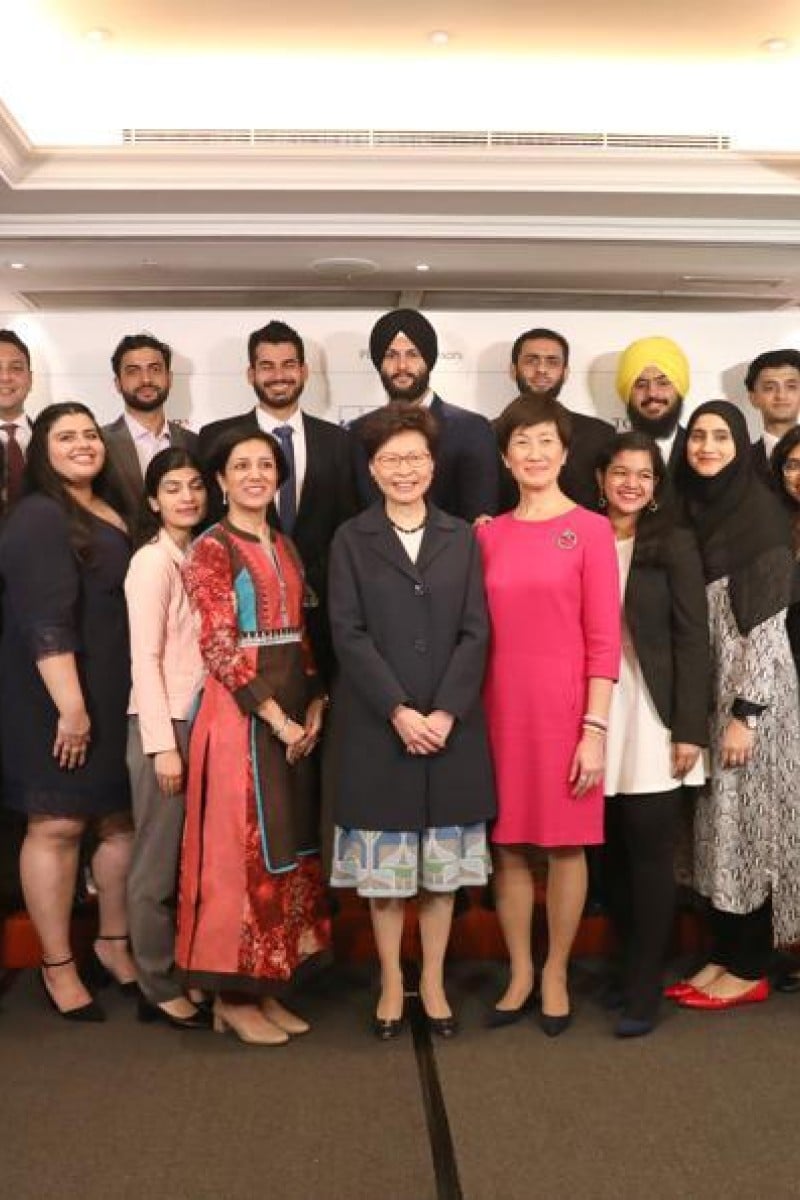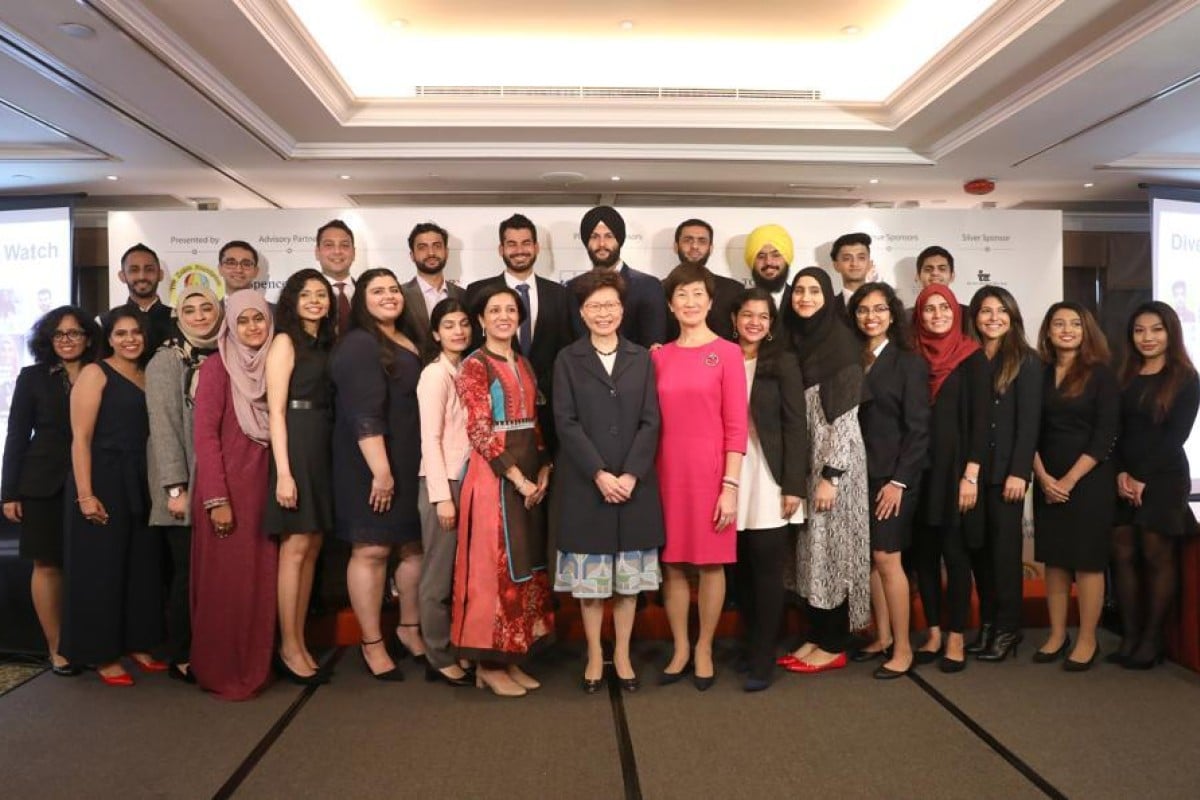
What it's like to grow up an ethnic minority in HK, and why the Diversity List is needed to address our city's discrimination
Ethnic minorities, despite calling Hong Kong their home, aren’t properly represented in government
 Hong Kong’s leader Carrie Lam (centre) joins this year’s Diversity List 2019: Youth to Watch.
Hong Kong’s leader Carrie Lam (centre) joins this year’s Diversity List 2019: Youth to Watch. “I was 15 when I took a part-time job working at Subway in Hong Kong. All the employees were Nepalese,” says Suskihanna Gurung, a 22-year-old Hong Kong born Nepalese woman.
“When I questioned why we were paid below the minimum wage, my colleagues told me that these were just the rules. I was shocked that people in my community believed that they could not be protected by the law.”
Gurung, the granddaughter of a Gurkha soldier, is no stranger to the discrimination and prejudice that many ethnic minority individuals experience in Hong Kong on a daily basis. “I asked my manager if I could take a day off work to get my HKDSE results,” she said. “But he just stared at me with a blank expression and said: ‘why do you need that?’”
Ethnic minority students in HK lack support and Cantonese assistance at local schools
Gurung proved him wrong, and became one of the first women within her community to be accepted to the University of Hong Kong (HKU), where she studied education and journalism. Last Saturday, she was featured on the Diversity List 2019: a list of 24 ethnic minority youth aged 18-35, who are qualified and committed to serve on government advisory boards.
The Diversity List is an initiative by social policy think tank and charity, the Zubin Foundation. Its aim is to encourage the government to appoint ethnic minority members to its advisory committees. Since its inception in 2016, the government has made 23 appointments from the Diversity Lists.
Hong Kong Chief Executive Carrie Lam Cheng Yuet-ngor officiated this year’s event, held at the Hong Kong Bankers’ Club in Central.
“We are fully committed to promoting equal opportunities for ethnic minorities and eliminating racial discrimination in Hong Kong,” she said. “We are also working to improve the administrative guidelines on Promotion of Racial Equality for all government bureaus and departments, as well as organisations that provide services to ethnic minorities.”
According to The Zubin Foundation, of the nearly 1,500 staff members serving on 100 publicly available advisory bodies, only 1.9 per cent are people from ethnic minority groups.
“I hope future generations of ethnic minorities have equal opportunities, and Hong Kong can live up to its name of Asia’s world city,” says 20-year-old Joy Pamnani.
Pamnani was born and raised in Hong Kong, and went through the local education system. She is now studying journalism and finance at HKU.
“Growing up in Hong Kong wasn’t easy,” she says. “I’d often feel like an outcast, and the local language isn’t easy to learn, and ethnic minority groups struggle in particular with employment, education and mental health."
A recent study by the Hong Kong Policy Research Institute found that ethnic minority students only understand 70 per cent of what is being taught in class, raising concerns about a lack of support for them in the education system.
“I want the education system to improve,” says Gurung. “I want teachers to be culturally sensitive and encouraging. I also want students – both local Chinese and other ethnicities – to learn about the history of ethnic minorities. It’s important to be represented accurately in textbooks.”
In 2014, Educational Publishing House, a company that makes textbooks for schools in Hong Kong and Macau, came under fire for stereotyping different nationalities in its books, which depicted the British as English teachers, and Filipinos as domestic helpers.
Hong Kong-born Pakistani, Riaz Adnan, also wants the government to tackle cultural sensitivity by providing training workshops for non-ethnic minority groups. “I have seen a lack of support when it comes to ethnic minority students with special education needs (SEN),” says the 18-year-old student from the Open University of Hong Kong.
Adnan’s cousin was born with Down syndrome and went to a Chinese-medium SEN school. “[My cousin] said he didn’t like the class environment, and his classmates were not close with him - though he spoke good Cantonese - because of cultural differences,” he said.
Adnan was also concerned about his cousin’s future after graduating. “It’s hard for even local Chinese SEN individuals to find a job after graduating,” he says. “But at least they speak fluent Cantonese and are well integrated within society.”
Unable to find work, his cousin went back to Pakistan after graduating, and he is unsure when he will return to Hong Kong.
Though recent government establishments – including the Steering Committee on Ethnic Minority Affairs – have brought more focus to racial inclusion, many feel there is a long way to go.
“I want both ethnically Chinese and minorities to learn about ethnic minority culture, and see the contributions we have made to society,” says Gurung. “We need to be seen as part of Hong Kong.”
